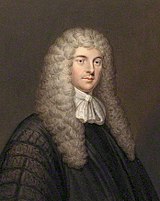
The Cavalier Parliament of England lasted from 8 May 1661 until 24 January 1679. It was the longest English Parliament, and longer than any Great British or UK Parliament to date, enduring for nearly 18 years of the quarter-century reign of Charles II of England. Like its predecessor, the Convention Parliament, it was overwhelmingly Royalist and is also known as the Pensioner Parliament for the many pensions it granted to adherents of the King.

Charles Davenant was an English economist, Tory politician and pamphleteer who sat in the Parliament of England representing the parliamentary constituencies of St Ives and Great Bedwyn.

Sir John Fenwick, 3rd Baronet was an English Army officer and politician. He succeeded to the Fenwick baronetcy after the death of his father, Sir William Fenwick. A supporter of the Jacobite cause, Fenwick was involved in a conspiracy to assassinate William III of England, and was executed by beheading in 1697 as a result.
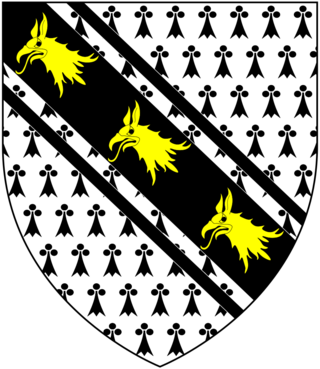
Sir Walter Yonge, 3rd Baronet of Escot in the parish of Talaton, Devon, was an English landowner and Whig politician who sat in the English and British House of Commons between 1679 and 1710.
Sir Michael Biddulph, 2nd Baronet, of Elmshurst, Staffordshire and Westcombe, Kent, was an English Whig politician who sat in the English and British House of Commons between 1679 and 1710.
Sir Thomas Frankland, 2nd Baronet, of Thirkleby Hall in Yorkshire, was an English landowner and Whig politician who sat in the English and British House of Commons from 1685 to 1711. He was joint Postmaster General from 1691 to 1715.
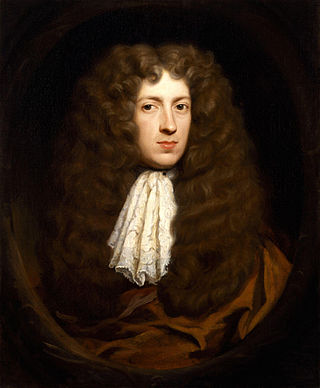
James Vernon was an English Whig politician who sat in the English and British House of Commons between 1679 and 1710. He was Secretary of State for both the Northern and the Southern Departments during the reign of William III.
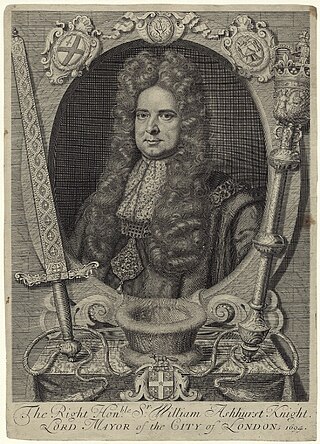
Sir William Ashhurst was an English banker, merchant and Whig politician who sat in the English and British House of Commons from 1689 to 1710. He also served as the Lord Mayor of London in 1693.
Peregrine Bertie DL was a British politician, the second son of Robert Bertie, 3rd Earl of Lindsey.
John Pulteney, of St James's, Westminster and Harefield, Middlesex, was an English lawyer and Whig politician who sat in the English and British House of Commons from 1695 to 1710.

The 1695 English general election was the first to be held under the terms of the Triennial Act 1694, which required parliament to be dissolved and fresh elections called at least every three years. This measure helped to fuel partisan rivalry over the coming decades, with the electorate in a constant state of excitement and the Whigs and Tories continually trying to gain the upper hand. Despite the potential for manipulation of the electorate, as was seen under Robert Walpole and his successors, with general elections held an average of every other year, and local and central government positions frequently changing hands between parties, it was impossible for any party or government to be certain of electoral success in the period after 1694, and election results were consequently genuinely representative of the views of at least the section of the population able to vote.
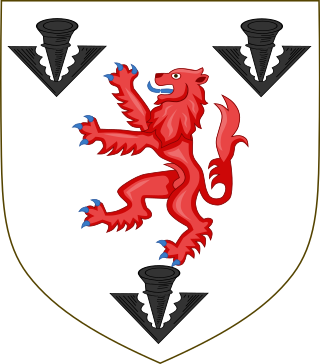
Charles Egerton, of Marchington, Staffordshire, was an English aristocrat and Whig politician who sat in the English and British Houses of Commons between 1695 and 1711.
Robert Monckton was an English landowner and Whig politician who sat in the English and British House of Commons between 1695 and 1713. He took an active part supporting William of Orange in the Glorious Revolution, and was notable for his involvement in a number of exceptionally bitter and prolonged electoral disputes.

George Barclay led an unsuccessful attempt to ambush and kill William III and II of England, Scotland and Ireland in early 1696.
Sir Gilbert Dolben, 1st Baronet (1658-1722), of Finedon, Northamptonshire, was an English lawyer, landowner and Tory politician who sat in the English and British House of Commons between 1685 and 1715. He also served as a High Court judge in Ireland for many years. He was the grandfather of the leading anti-slavery campaigner Sir William Dolben.

The 2nd Parliament of King William III and Queen Mary II was summoned by William III of England and Mary II of England on 6 February 1690 and assembled on 20 March 1690.

The 4th Parliament of William III was summoned by William III of England on 13 July 1698 and assembled on 24 August 1698. The party political constitution of the new House of Commons was 246 Whigs, 208 Tories and 59 others. Sir Thomas Littleton, the Whig member for Woodstock, was elected Speaker of the House. The house was divided between the pro-government faction led by the Whig Junto and a Country Whig-Tory alliance, the New Country party, led by Robert Harley.
Henry Pelham was an English Member of Parliament. A younger son of Sir John Pelham, 3rd Baronet, he was returned for two Parliamentary constituencies in Sussex, where the family held considerable influence, for most of the time between 1690 and 1702. Appointed to the sinecure office of Clerk of the Pells in 1698, Pelham was a reliable Whig and Court-supporting placeman.
